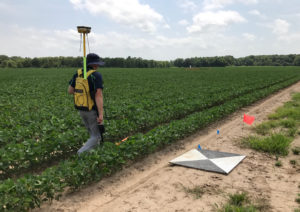Three projects, funded by the U.S. Department of Energy (DOE), leverage Berkeley Lab’s strengths in artificial intelligence, sensors, and ecological biology to make agriculture more sustainable and more profitable. They aim to quantify and reduce the carbon intensity of agriculture—including the farming of biofuel feedstocks such as corn, soy, and sorghum—while also increasing yield. Two of the new projects are part of the SMARTFARM program of DOE’s Advanced Research Projects Agency-Energy (ARPA-E). This initiative aspires to make the biofuel supply chain carbon negative, which would greatly improve biofuel’s benefits to the broader economy and environment.

In the first project, researchers led by Blake Simmons, director of Biosciences’ Biological & Systems Engineering (BSE) Division, working with project lead, Arva Intelligence, will monitor five commercial farms in California and Arkansas growing corn and crops for straw. The farms will be equipped with state-of-the-art sensors to assess fertilizer, water, energy use, and crop yield, while monitoring towers registered with DOE’s AmeriFlux network will measure emissions of carbon dioxide, nitrous oxide, and methane at subsecond resolution.
The Berkeley Lab team is considering anaerobic digestion of crop residues to biogas as a viable pathway for farmers. “Crop residues are actually the largest pool of readily available sustainable biomass that you can efficiently convert into biofuels and bioproducts,” Simmons said. “We can use that as the feedstock. So, you’re producing food and fuel and fiber from the same field and maximizing the carbon conversion efficiency on a per-acre basis. That is the reason why, ultimately, we believe this pathway has a much better eco- and carbon-balance than other pathways.”
ARPA-E awarded Arva $2.95 million for the project, of which $1.6 million will go to Berkeley Lab. In addition to Simmons, researchers from Berkeley Lab’s Earth and Environmental Sciences Area, the DOE Joint Genome Institute, and the University of Arkansas are also involved.
Read more in the Berkeley Lab News Center.



